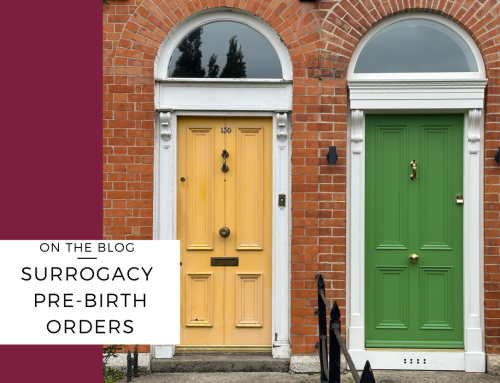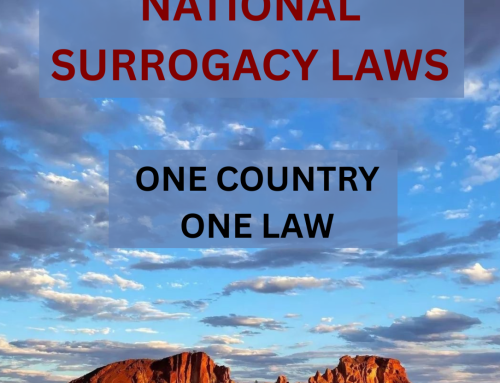How does it feel, to give away a baby?
Good question, and probably the most common question I’ve received since I gave birth. And usually the follow up comment is “I could never give away a baby.” Don’t worry, I thought that too, once a upon a time. I think surrogates appreciate that giving away a baby is pretty weird to most people, unless they really understand surrogacy. But while it might seem weird and even outrageous, it’s important to remember that on the whole, surrogates are well-adjusted, well-supported and happy to be doing what they’re doing. The worst response you can give them is sympathy – I’ve had people say “Oh that must have been so hard.” Trust me when I say – while surrogacy is complex, giving a baby to the intended parents is not the hard part.
The short answer is: It was amazing. It was one of the best things I’ve ever done in my entire life. Not once have I ever regretted any of it. It is the gift that keeps giving back – every time I see her with her dads, I feel a rush of love and pride and joy that I played a part in her being here. I get to experience that, for the rest of my life.
The long answer is a little more complex. Babies born through surrogacy are conceived with the intention that they will be raised by the intended parents, not by the birth parents. At every moment, well before the conception takes place, the birth mother thinks she will be handing over the baby. In fact, she thinks about that moment a lot. She is excited for the moment that she can see the intended parents with their baby.
So when it comes to handing over the baby to the intended parents, it is not just something we are happy to do, it feels completely natural and amazing, and we don’t have a second thought about it. I haven’t met a surrogate who has reconsidered whether she will hand over the baby at the birth.
The team will have their own surrogacy birth plan and ideas for what happens at the birth and in the days afterwards. And while birth often doesn’t go according to plan, the surrogate handing over the baby and the intended parents taking care of the baby is pretty straight-forward. The intended parents will return home with the baby, and the surrogate will return home to her family.
The days and weeks after the birth can feel like a bit of a roller-coaster. Katrina Hale and I talked about it in this Podcast episode. There is no guide book for how anyone should feel. I remember feeling quite overwhelmed with love and was probably flooded with oxytocin (that’s the love hormone). And because I didn’t have a baby to care for, I wasn’t sure where to put all these positive feelings. But while the hormones were running wild, I never felt a sense of loss or grief for the baby. I felt some sadness that my role as a surrogate had finished, and that my intended parents might be too busy to hang out with me. But I did not grieve for the loss of the baby. I had lots of people assuming that I was grieving, that “it must be hard,” but truthfully, it was amazing and complex, but it was not hard.
There is something that I think we can take away from surrogacy as part of the human experience. Society has expectations of what motherhood should be like, and how mothers should behave. We are expected to enjoy every second of motherhood, and feel absolutely devoted and connected to our children, 100% of the time. I think surrogacy challenges this idea – I gave birth to a baby, genetically related to me, and I gave her to someone else to raise, and did not grieve for her. There is scientific research that shows that what we might consider ‘maternal instinct’ is in fact an increase in oxytocin, and which anyone can experience, even if they have not birthed the baby.
Research by Professor Ruth Feldman shows that a father’s (or non-birth parent’s) brain is just as sensitive to structural and hormonal changes as the birth mother. It was indeed what I observed – my intended parents responded to the baby the way I responded to my two children when they were born. On the other hand, I did not respond to surro-baby in the same way. It felt similar to when my friends had a baby. I love the baby, I think she’s amazing, but I did not feel any ‘instinct’ to care for her or respond to her needs. The idea that I might have to care for her was, frankly, terrifying.
It is reductive, to suggest that a surrogate must grieve when she hands over a baby that was intended for other people to raise. It says that women are slaves to our hormones and our ‘motherly instinct’ and that we are simple creatures not capable of complex emotions – like loving a child and not wanting to care for it. The more I learn about surrogacy and motherhood, the more I know that humans are complex and capable of a range of thoughts and emotions.
Women who are considering becoming surrogates might be interested in how they will feel, when they hand over the baby. I remember wanting to know whether I would fall apart and was there anything I could to do soften the fall? And when I asked my surrogate sisters, the answer was – you guessed it – complex. But while many of us would describe it as a rollercoaster of emotions in the weeks after the birth, the rollercoaster was often related to hormones and the changing relationships with our intended parents. For those of us who had a positive experience, it was to do with having a good support system and a great relationship with our intended parents. For those that have a rocky time, it is often linked to less than happy relationships with the intended parents. A surrogate’s overall well-being and contentment with her experience has very little to do with handing over the baby, and more to do with her relationship with the intended parents. To that end, the team really needs to focus on getting their expectations on the same page and building a strong foundation through counselling.
If you are new to surrogacy, you can read about how to find a surrogate, or how to become a surrogate yourself. You can also download the free Surrogacy Handbook which explains the processes and options. Have you thought about joining Surrogacy Australia’s Support Service? Read this first.
You can read more about my thoughts on surrogacy and motherhood, and on my reflections on the first year after I gave birth.
I’ve written a book, More Than Just a Baby: A Guide to Surrogacy for Intended Parents and Surrogates, which is the only guide to surrogacy in Australia.
You can find more information in the free Surrogacy Handbook, reading articles in the Blog, by listening to more episodes of the Surrogacy Podcast. You can also book in for a consult with me below, and check out the legal services I provide.








